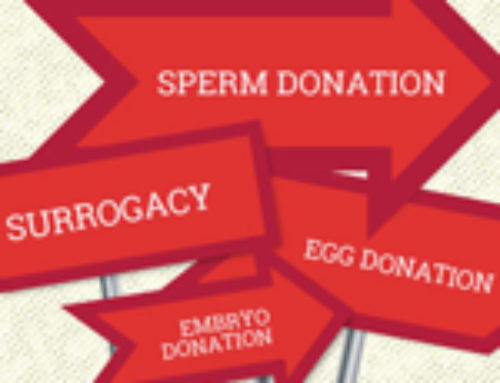PCOS does not preclude pregnancy. It does demands more patience for the extra time it may take to conceive. Therein resides a great deal of the problem, and at the same time, hints at the solution. How could this be? Patience is a component of resilience. And resilience, the ability to bounce back after an insult, makes for the kind of coping that can take you from frustration, to freedom from strife—from reactivity to responsiveness.
Anyone who has ever frolicked in the ocean learns how to avoid getting knocked over by the waves. When a breaker is rolling toward you with its powerful churning energy, diving under it keeps you safe. The imagery of the surf, with its potency and relentless momentum, is a fit metaphor for infertility. And PCOS can create a struggle to conceive.
During my 35 years serving the infertility population as a psychotherapist, I’ve seen infertility rob strength from the most stress-hardy. But, I’ve also been privy to the resilience that carries to parenthood those who, like yourself, have suffered under the strain.
 The frenzy of infertility drains energy. But many apply mental muscle to fight the good fight, which under the circumstances can feel like a car in overdrive with the emergency brake yanked up. While applying mental muscle as a coping mechanism to push through the challenge can be effective, diving under the turbulence renews energy and builds resilience. Diving under the turbulence can be learned and resiliency can be earned.
The frenzy of infertility drains energy. But many apply mental muscle to fight the good fight, which under the circumstances can feel like a car in overdrive with the emergency brake yanked up. While applying mental muscle as a coping mechanism to push through the challenge can be effective, diving under the turbulence renews energy and builds resilience. Diving under the turbulence can be learned and resiliency can be earned.
Infertility leaves everyone feeling out of control. Dietary is one thing that you can control. Giving yourself a respite from the stress is a very powerful way to reclaim control—not of being on this journey, but how you’re on it. Read on to learn how to empower yourself.
The October, 2009 issue of Fertility and Sterility* published a report of a study in which “problem-focused coping” was distinguished from “letting-go coping.” Problem-focused coping is about doing something to alter the circumstances (like altering your diet), whereas letting-go coping is about shifting to a different mindset by diving under the turbulence and entering an “infertility-free zone.” There are lots of ways to dive under the turbulence: meditation, hypnosis, self-hypnosis and guided imagery are some of the better known among the letting-go techniques. For purposes of this post, the Relaxation Response™ can be easily learned.
The Relaxation Response™ ** utilizes the power of the breath as a built-in tranquilizer to calm the autonomic nervous system. This means that if you breathe easily and rhythmically, as if all is right with the world even if you do not feel that it is, the brain stem responds by lowering blood pressure, heart rate and muscle tension and breaks the grip of other symptoms as well. If simultaneously you say a word (in your mind—not out loud) with a positive association such as “love” or “peace” every time you exhale, you can “let go” of the panic or depression which keeps the stress physiology of infertility at a feverish pitch. This also keeps you in the present moment. A variation of the Relaxation Response involves saying half of a phrase (such as “I am / at peace”) or prayer (“the Lord / is my shepherd,” for example) to yourself on the inhalation and the other half on the exhalation. By repeating a word, phrase or prayer in your mind for 10 to 20 minutes, in co-ordination with your breathing, you dive under the turbulence. You need to know that when you lose your place, let it go and start again. Take a few moments and try it! It’s been field-tested and shown to be very effective.
Staying focused on the breath and simultaneously on a positive thought breaks the spasm of stress and allows you “catch a breather.” Therein lies the route to experiencing your capacity for resilience. The frenzy of infertility only intensifies if we can’t let go; conversely we find serenity if we can. If the Relaxation Response becomes part of your daily routine, you will be pleasantly surprised at your power to manage stress.
There are many disappointments and set-backs when struggling with infertility. Letting-go builds resilience for the next leg of the journey. Finding your resiliency, finding your capacity for patience might just be as good as it gets. But, by the way: letting-go coping is “significantly associated” with pregnancy rates as reported in Fertility and Sterility.*
It may seem that the only “cure” for PCOS is medical, consider that the mind/body connection is a fact that can figure into outcome.
*Nathalie Rappoport-Hubschman, M.D., Yori Gidron, Ph.D., Rivka Reicher-Atir, Ph.D., Onit Sapir, Ph.D., and Benjamin Fisch, M.D. “Letting go” coping is associated with successful IVF treatment outcome, Fertility and Sterility, October, 2009, Volume 92, No. 4, pp.1384 – 1388.
** The Relaxation Response was pioneered over 30 years ago by Dr. Herbert Benson, founder of the mind/body medical institute at Harvard and author of the book by the same name. Its efficacy has been field tested. When practiced regularly, the body reclaims a state of equilibrium that we lose when stress sends us flying into a state of physiological agitation.
Helen Adrienne, LCSW, BCD
Psychotherpist, Clinical Hypnotherapist, Practitioner of Mind/Body Therapy
420 East 64th Street, NY, NY 10065
212-758-0125





